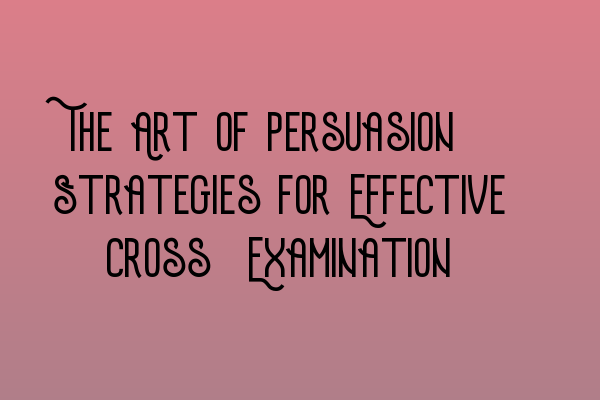Title: The Art of Persuasion: Strategies for Effective Cross-Examination
Introduction:
In the realm of criminal law, the skillful art of persuasion holds paramount importance. Among the various important skills a criminal lawyer must possess, the ability to conduct an effective cross-examination is crucial. A well-executed cross-examination can make a significant impact on the outcome of a case. In this comprehensive guide, we will explore proven strategies that enable solicitors to master the art of persuasion and deliver impactful cross-examinations.
1. Preparation is Key:
Before entering the courtroom, meticulous preparation is essential. Familiarize yourself with the case details, scrutinize witness statements, review all evidence, and identify potential weaknesses. By having a deep understanding of the case, you will be able to ask targeted and effective questions during cross-examination.
2. Maintain Control:
Successful cross-examinations require the solicitor to maintain control of the witness. Begin by establishing a clear and respectful tone, firmly but subtly guiding the witness through your line of questioning. Always maintain an air of professionalism and avoid becoming confrontational or aggressive.
3. Establish Credibility:
To persuade the jury, the solicitor must establish their credibility early on. Use your cross-examination to subtly highlight any inconsistencies or biases displayed by the witness. By exposing contradictory statements or questionable motives, you will weaken the witness’s credibility and enhance your own.
4. Ask Leading Questions:
Leading questions are an indispensable tool in persuading a witness to provide the desired response. Frame your questions to guide the witness towards confirming the points favorable to your case. By using open-ended questions, you can effectively control the direction of the cross-examination.
5. Present Contradictions:
An effective cross-examination is built upon identifying and presenting contradictions. Utilize prior statements, testimonies, or evidence to highlight any inconsistencies in the witness’s statements. By skillfully presenting contradictions, you cast doubt on the witness’s credibility and weaken their testimony.
6. Utilize the Power of Hypotheticals:
Using hypothetical scenarios can be a powerful tool during cross-examination. Paint a vivid picture that challenges the witness’s version of events or exposes gaps in their understanding. By doing so, you can effectively demonstrate the weaknesses in their testimony and enhance your argument.
7. Understand Nonverbal Communication:
Nonverbal cues often reveal more information than words alone. Pay close attention to the witness’s body language, facial expressions, and tone of voice. Look out for signs of discomfort, uncertainty, or inconsistencies. Skillful observation and interpretation of these nonverbal cues can lead to uncovering hidden truths and enhancing your persuasive abilities.
8. Maintain Precision:
During cross-examination, precision is of utmost importance. Phrase your questions in a clear and concise manner to avoid misinterpretation or confusion. Stay focused on the key issues and avoid unnecessary digressions. This precision will reinforce your arguments and help you maintain control over the proceedings.
Conclusion:
Mastering the art of persuasion through effective cross-examination is a skill that requires time, practice, and a deep understanding of criminal law. By employing the strategies discussed in this guide, you can enhance your ability to persuade the jury and influence the outcome of a case. Remember, preparation, control, credibility, leading questions, contradictions, hypotheticals, nonverbal communication, and precision are the pillars to becoming a persuasive solicitor. With dedication and experience, you can elevate your skills as a solicitor and thrive in the complex world of criminal law.
For professional assistance and expert advice in criminal law matters, SQE Criminal Law & Practice Law UK is here to serve you. Contact us today for personalized guidance tailored to your legal needs.
Please note that the above blog post is for informational purposes only and does not substitute professional legal advice.
